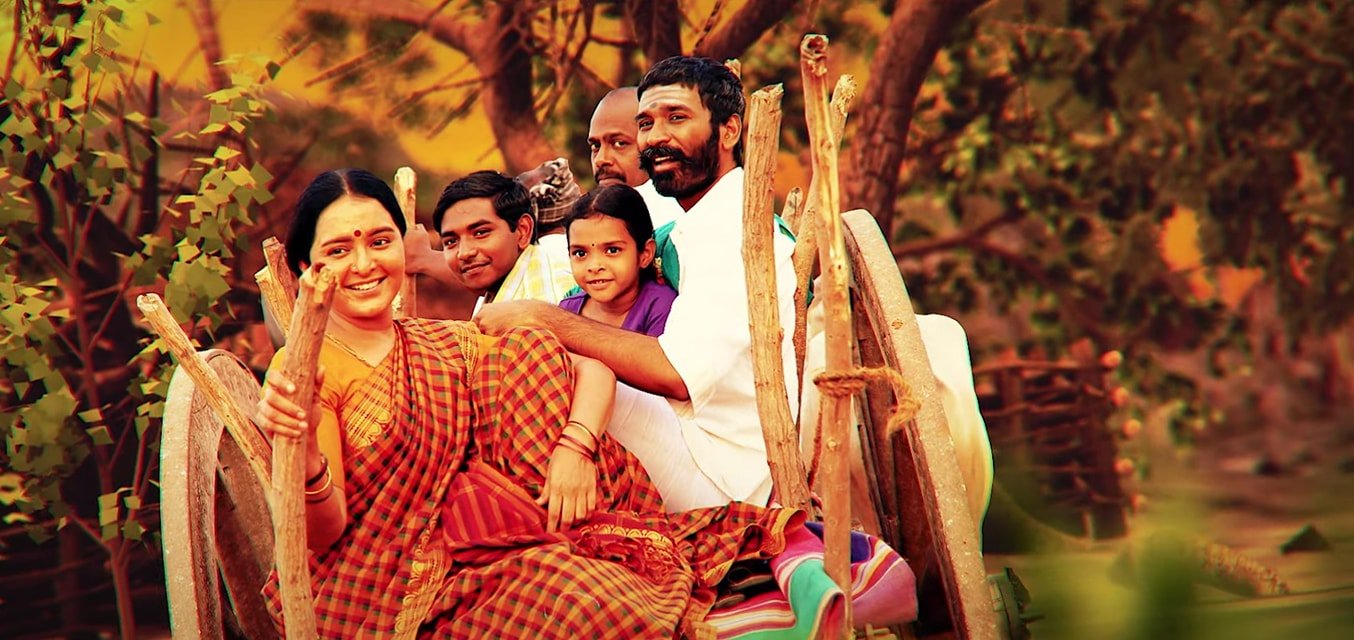
We live in times when the civilians and several of India’s ruling party representatives have begun questioning the reservations set aside for the disadvantaged Scheduled Castes/Tribes (SC/ST). It is at this outset that director Vetrimaaran brings to us Asuran – a compelling period drama set between the 1950s and mid-1980s). However, the issues it highlights are relevant to date with India’s social fabric barely having undergone a metamorphosis besides erasable surface gloss. Featuring Dhanush in the titular role, the film uses several of Tamil cinema’s characteristic commercial elements to spin a revenge saga of epic proportions.
I remember how, back in 2018, filmmaker Pa Ranjith dared to make a film (Kaala) which marvelously utilized the popular standing of a matinee idol (Rajinikanth). The film contained a very strong message but not without its own reservations to fully shed its leading man’s aura. While this isn’t exactly a scathing criticism provided how gloriously effective the said film was, Vetrimaaran in Asuran confidently explores the vacuum it evaded. Dhanush’s Sivasami is a lower-caste man from interior Tamil Nadu and the film lets him grow from his twenties to fifties with negligible starry traces. If we ignore the slow-motion technique used in key action sequences and the associated sound effect of a majestic wind instrument, it is hard to imagine if Sivasami was supposed to be canvassed with a mainstream superstar in mind.
Back to the premise which is adapted from novelist Poomani’s novel ‘Vekkai’, Asuran begins in the ‘80s where Sivasami (along with his son Chidambaram) is seen fleeing his home whilst his wife Pachaiyammal (Manju Warrier) does so in another direction with her little daughter. The opening shot scene, wherein Sivasami splashes over a moon reflection in a water body as he secretly treads a trek to a hill, sets the film’s frightful mood. On the surface, Asuran is somewhat in the popular cinema mould – there is a hero with a heartbreaking history and a venomous villain (Adukalam Naren as Narasimhan) who simply refuses to budge. However, the angle where the screenplay (credited to Manimaaran and Vetrimaaran) infuses life into this familiar plot-line is in the way it examines the socio-political backgrounds.
The writers, pretty early in the film, establishes Sivasamy’s status quo with Narasimhan. Besides an opening montage that explains the conflict between two clans, Vadakkurs and Thekkurs, we sense how there is something amiss that the film is holding back to as if to be revealed at a later stage. Reveal, it does, immediately after the interval as is the case with several of contemporary Indian films (Kartik Subbaraj’s Petta being a similar one). The only hiccup here is that the flashback segment feels overlong. There is a range of new (and critical) characters being introduced and a sub-plot that emerges turns out to be so volcanic that it nearly threatens to overshadow the film’s minimalist yet focused narrative. It is in this brief passage that the writers decide the spill the essence of Poomani’s original story. It is seen how Sivasamy’s then-fiancée Mariyammal (Ammu Abhirami) was shamed for wearing footwear by Narasimhan. There is also a needless upper-caste saviour represent in the form of a benevolent lawyer Venugopal Seshadri (Prakash Raj). The segment also give a glimpse of the slowly emerging awareness amongst the oppressed classes. Even the housewives – when interrupted during their banter – demand their little girl children to go and study. It is somewhere in the late ‘50s or the early ‘60s and one easily gets the picture. Ditto for Mariyammal’s penchant for education, the placard campaign, clandestine speeches et al.
One with a bunch of clever dialogues, Asuran is sprinkled with subtle political references that shout from the rooftops that this isn’t a regular Kollywood no-brainer. That said, it is appreciable how Vetrimaaran does so without shedding the leading man of his default propensity to emerge a hero. For instance, upon facing rejection by several women for marriage owing to his background, Sivasami is whole-heartedly accepted by Pachaiyammal who nearly hero-worships his actions. No, this isn’t an anomaly in any manner but is a reflection of a rural woman’s mindset – on how she envisions her future husband-to-be, in times of uncertainty and deficiency. In a later scene, asserting her man’s bravado further, the woman tells her hot-blooded teenager son (who kills someone) about how he inherited the very same qualities from his father.
Asuran is also one of the most violent Indian films to come out in recent times. Vetrimaaran tries to keep it real and, as a result, the visuals are often graphic and are not for the faint-hearted. The action choreography (Peter Hein) is extremely realistic and they seldom look staged. Velraj’s cinematography creates an atmosphere which, in all its period countryside glory, is quietly eerie. The muted color palette, complete with certain astonishing aerial shots, is so immaculately merged into the narrative that it consistently elevates the intrigue and volatility that the story organically contains. The interval point, that way, is equally a masterstroke from the visual point of view as it is from the writers’. G.V. Prakash Kumar’s OST is one of thunderous impact and one must give it to the composer-director duo for not treading the over-the-top route.
Vetrimaaran also extracts a controlled performance from Dhanush. Be it with his meticulous diction or minimal and effective ways to express his emotions, the actor makes Sivasami his own. Matching him head-to-head is Manju Warrier who is a complete revelation as Pachaiyammal. With her sun-scorched skin, anguished throw of words (she dubbed for herself, as always) and fluid body language, it is astonishing how Warrier transforms into a distressed rural woman in her maiden Tamil film. Pasupathy is effective yet again in a small yet pivotal part. Newcomer Ken Karunas is superlative as Sivasami’s hot-tempered son. Not an easy part to ace, the young actor is especially notable in the pre-interval passage where he deems his father as worthless. Another newbie, Teejay Arunasalam boasts of a compelling screen presence and the impact of his brief appearance radiates throughout the film’s runtime. Aadukalam Naren, although saddled with fewer layers, spells menace and his growth trajectory through the decades is as convincing as Dhanush’s.
If I were to point out an area of major concern in Asuran, it is with respect to the dubbing synchronization. Whilst the sound design is broadly well-done with respect to Foley and other atmospheric sounds, the lip movements for a good chunk of the film’s duration is visibly out of sync. Plus, the expressions of the actors, in several instances, do not match the booming effect in their respective voices. It is a severe woe in an otherwise terrific film. Where could they have gone wrong? Is it some sort of a last-minute misfire or is it about the sound team underestimating the sound systems of modern-day cinemas? Either be the case, Asuran is marred by this easily avoidable backfire.
On a closing note, I must also applaud Vetrimaaran’s abilities to cover up such anomalies with his unique storytelling style. The finale is predictable by syntax but it is compelling how the filmmaker stages the show in a profound manner which not only completes the hero’s journey but also leaves enough food for thought. Every character is etched to perfection and their visual projection is even better with the actors owning the mood and the era with a clear-cut understanding of the material in hand. Commenting strongly on the class-caste divide, the title Asuran (which roughly translates to ‘devil’) is also tricky as one sees how the oppressed clan is forced to flaunt devilish shades to seek what they truly lack and deserve. It was further striking to see Vetrimaaran paint striking visuals such as the one where Sivasamami drops a dry smile to his family – a moment that is going to stay with me for a long time for its sheer ambiguous beauty.
Rating: ★★★★

